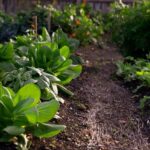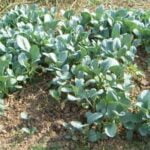If you’ve ever wondered, “Is Molemax safe for vegetable gardens?” then look no further for the answer. Molemax is a popular choice for controlling pests in vegetable gardens, but it’s important to understand its impact on edible plants. In this article, we will explore the purpose of Molemax in vegetable gardens and its safety for use around edible plants.
Molemax is a product designed to repel pests such as moles, voles, gophers, and armadillos from lawns, gardens, and planting beds. While it is effective in keeping these unwanted visitors at bay, there are concerns about its impact on the safety of vegetables and other edible plants. Understanding the ingredients of Molemax and their potential impact on vegetables is crucial for making an informed decision about using this product in your garden.
In the following sections, we will delve into the ingredients of Molemax and their impact on vegetables, as well as explore whether Molemax is safe for edible plants. We will also examine the effectiveness of Molemax in repelling garden pests and discuss any potential risks associated with using this product in vegetable gardens. Stay tuned to learn about best practices for using Molemax in vegetable gardens and alternative natural methods for pest control.
Understanding the Ingredients of Molemax and Their Impact on Vegetables
Molemax is a popular product used in vegetable gardens to repel pests such as moles, voles, and gophers. It is specifically designed to protect the roots of plants from being damaged by these underground pests. However, it is important for gardeners to understand the ingredients of Molemax and their potential impact on the vegetables and other edible plants in their garden.
The main active ingredient in Molemax is castor oil, which is known for its ability to deter pests such as moles and voles. Castor oil works by making the soil taste unpleasant to these animals, causing them to avoid it.
While castor oil is generally safe for use around edible plants, it is important to note that excessive use can potentially affect the taste of the vegetables grown in the garden. It is also recommended to carefully follow the application instructions provided on the product packaging.
In addition to castor oil, Molemax may also contain other natural ingredients such as granulated clay or other inert materials. These additional components are typically included to help distribute the active ingredient evenly throughout the soil. Overall, when used according to the instructions, Molemax can be safe for vegetable gardens and other edible plants. Gardeners should always read and follow all label directions before using any product in their garden.
| Ingredient | Impact on Vegetables |
|---|---|
| Castor Oil | Deters pests but may affect taste if used excessively |
| Granulated Clay or Inert Materials | Helps evenly distribute active ingredient in soil |
Is Molemax Safe for Edible Plants?
Understanding the Safety of Molemax
Molemax is a popular product used in vegetable gardens to repel unwanted pests such as moles, voles, gophers, and armadillos. However, many gardeners are concerned about the safety of using Molemax around edible plants. It is important to understand the ingredients of Molemax and their impact on vegetables to determine its safety for use in vegetable gardens.
Ingredients of Molemax and Their Impact on Edible Plants
Molemax contains a variety of active ingredients, including castor oil and garlic oil. These natural substances work to repel pests by emitting strong odors and tastes that deter animals from digging or feeding in treated areas. When applied correctly according to the manufacturer’s instructions, these ingredients are considered safe for use around edible plants.
Is Molemax Safe for Vegetable Gardens?
When used as directed, Molemax is considered safe for vegetable gardens. The active ingredients in Molemax have been found to be non-toxic to humans and pets, making it a suitable option for gardeners looking for an effective pest control solution that won’t harm their edible crops. However, it is important to always read and follow the label instructions carefully to ensure the proper application and minimal risk to your vegetable garden.
Effectiveness of Molemax in Repelling Garden Pests
Molemax is a popular product used by many gardeners to repel pests and protect their vegetable gardens. This section will explore the effectiveness of Molemax in keeping garden pests at bay, as well as its impact on the overall health of the garden.
Repelling Common Garden Pests
Molemax is known for its effectiveness in repelling a wide range of common garden pests that can wreak havoc on vegetable gardens. This includes rodents such as moles, voles, gophers, and armadillos, as well as other underground pests. The active ingredients in Molemax work to create an unpleasant environment for these pests, driving them away from the treated area. This can be particularly beneficial for vegetable gardens, where these pests can cause significant damage to crops.
Impact on Beneficial Insects
While Molemax is effective at repelling unwanted pests, it is important to consider its potential impact on beneficial insects in the garden. Some gardeners have reported that Molemax may also deter beneficial insects such as earthworms and bees. However, further research is needed to fully understand the extent of this impact and whether it truly outweighs the benefits of using Molemax.
Long-Term Results
Many gardeners have found Molemax to be effective in the short term for repelling pests from their vegetable gardens. However, it is important to consider the long-term results of using this product. Some users have reported that pests may become resistant to Molemax over time, leading to decreased effectiveness. Therefore, it is crucial for gardeners to monitor their gardens closely and consider alternative methods for pest control if they notice a decline in Molemax’s effectiveness.
Overall, while Molemax can be effective in repelling garden pests from vegetable gardens initially, there are considerations about its impact on beneficial insects and long-term results that should be taken into account when deciding whether or not to use this product.
Potential Risks of Using Molemax in Vegetable Gardens
When considering the use of any pest control product in a vegetable garden, it is important to weigh the potential risks involved. This section will address the concerns regarding the use of Molemax in vegetable gardens and provide information to help gardeners make informed decisions.
Molemax contains an ingredient called castor oil, which is known for its ability to repel pests such as moles, voles, gophers, and armadillos. While castor oil itself is generally considered safe for use around edible plants, Molemax may also contain other ingredients that could pose a risk to vegetables. It is important for gardeners to carefully review the label of any pest control product, including Molemax, to understand all of its ingredients and their potential impact on their vegetable garden.
One common concern among gardeners is whether Molemax can leave harmful residues on vegetables. According to the manufacturer’s instructions, Molemax should be applied away from the root systems of edible plants and any exposed fruits or vegetables. However, some gardeners may still worry about the potential for contamination. It is important to follow application guidelines closely and avoid using Molemax near areas where vegetables are grown if this concern arises.
| Concerns | Recommendations |
|---|---|
| Potential impact of ingredients on vegetables | Review label for all ingredients; Apply away from vegetable roots |
| Risk of residues on vegetables | Follow application guidelines; Avoid using near vegetable growing areas |
Best Practices for Using Molemax in Vegetable Gardens
Molemax is a popular product used in vegetable gardens to repel pests and protect the plants from damage. When using Molemax in your vegetable garden, it is essential to follow best practices to ensure its effectiveness while also keeping your edible plants safe.
Here are some best practices for using Molemax in your vegetable garden:
- Read and Follow the Instructions: Before applying Molemax in your vegetable garden, be sure to carefully read the product label and follow the instructions provided. This will help you understand the recommended usage and application rates for your specific type of vegetables.
- Apply During Dry Conditions: It is best to apply Molemax during dry conditions, as rain can wash away the product, reducing its effectiveness. Be sure to check the weather forecast before applying Molemax to ensure that there is no rain expected within 24 hours.
- Use Protective Gear: When handling and applying Molemax, it is important to use protective gear such as gloves and a mask to prevent any skin or respiratory irritation.
It is also important to consider whether Molemax is safe for vegetable gardens when following these best practices. Many gardeners may wonder, “Is Molemax safe for vegetable gardens?” The answer lies in understanding the ingredients of Molemax and their impact on vegetables, which will be discussed in the following section.
Alternative Natural Methods for Pest Control in Vegetable Gardens
When it comes to pest control in vegetable gardens, there are several alternative natural methods that can be just as effective as using Molemax. These methods are not only safe for edible plants, but they also pose little to no risk to the environment or beneficial insects. Here are some alternative natural methods for pest control in vegetable gardens:
- Companion planting: Some plants have natural properties that repel pests. For example, planting marigolds near your vegetables can help deter nematodes, while planting basil can repel mosquitoes and flies.
- Homemade sprays: DIY sprays made from ingredients like garlic, neem oil, or hot pepper can be effective in repelling common garden pests such as aphids, caterpillars, and mites.
- Beneficial insects: Introducing predatory insects like ladybugs and lacewings into your garden can help keep pest populations in check. These insects feed on common garden pests without causing harm to your vegetables.
Using these alternative natural methods for pest control is not only safe for vegetable gardens, but it also promotes a healthy and balanced ecosystem in your garden. By implementing these practices, you can effectively manage pests without resorting to potentially harmful chemicals like Molemax.
It is important to note that while Molemax may be effective in repelling certain garden pests, its impact on the environment and edible plants is a cause for concern. Opting for natural alternatives not only ensures the safety of your vegetable garden but also contributes to sustainable gardening practices that benefit both the environment and your health.
Conclusion
In conclusion, when deciding whether to use Molemax in your vegetable garden, it is important to consider the potential impact on the safety of your edible plants. While Molemax is designed to repel garden pests and protect your vegetables, it is crucial to understand the ingredients and their impact on your crops. The key question remains: is Molemax safe for vegetable gardens?
Understanding the ingredients of Molemax and their potential effects on edible plants is critical in making an informed decision. It is also essential to weigh the effectiveness of Molemax in repelling garden pests against any potential risks. While Molemax can be an effective solution for controlling pests in vegetable gardens, it’s essential to consider alternative natural methods for pest control that may be safer for your crops.
Ultimately, when using Molemax in your vegetable garden, it is crucial to follow best practices and use the product according to instructions. Additionally, considering alternative natural methods for pest control may provide a safer option for protecting your vegetable crops. Making an informed decision about using Molemax in your vegetable garden involves weighing the potential benefits and risks while prioritizing the safety of your edible plants.
Frequently Asked Questions
Is MoleMax Safe for Vegetable Garden?
MoleMax is generally considered safe for use in a vegetable garden. It is made from natural ingredients and does not harm plants, so it can be safely used to repel moles without causing damage to the garden.
Is Mole Repellent Safe for a Vegetable Garden?
Mole repellents are generally safe for vegetable gardens as long as they are used according to the manufacturer’s instructions. It’s important to choose a repellent that is designed specifically for use in gardens and will not harm edible plants.
Will Castor Oil Harm My Vegetable Garden?
Castor oil is often used as a natural mole deterrent, and it is typically safe for vegetable gardens. However, it should be used sparingly and diluted with water to avoid any potential harm to the plants. As with any product, it’s best to read and follow the instructions carefully.

If you’re looking to get into vegetable gardening, or are just looking for some tips on how to make your current garden better, then you’ve come to the right place! My name is Ethel and I have been gardening for years. In this blog, I’m going to share with you some of my best tips on how to create a successful vegetable garden.





